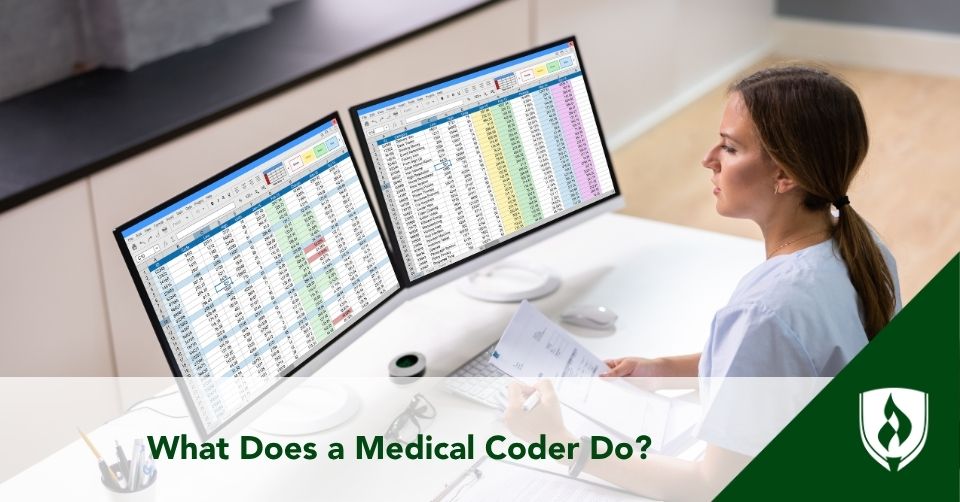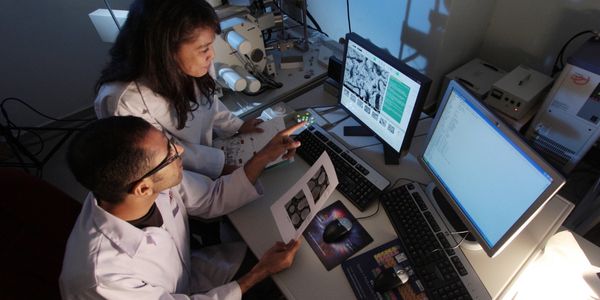What Does a Medical Coder Do?
06/26/2025

As the healthcare industry becomes digitized and reliant on data, medical coding can be considered as one of the most essential careers supporting both patient care and provider operations. If you’re asking, “What does a medical coder do?” you’re not alone. With flexible work settings and opportunities to contribute to the healthcare system without direct patient interaction, it’s a career worth considering.
Explore the responsibilities of professional coders, how they work with healthcare providers and insurance companies, what it takes to become a medical coder, and why this role is crucial to the billing process and the accuracy of electronic health records (EHRs).
Understanding the Role of a Medical Coder
Medical coders transform1 a patient’s medical documents into standardized alphanumeric codes. These codes represent the medical services, diagnoses, and procedures a patient received during a healthcare visit. Properly coded patient records ensure accurate billing, insurance reimbursement, and legal documentation.
Medical coding is the bridge between healthcare professionals and the financial systems that keep healthcare facilities running. Without correct codes, insurance companies may deny claims or delay payment, which impacts both patients and providers.
Why Medical Coders Matter in the Healthcare Industry
Each time a patient receives medical care, from routine checkups to emergency surgeries, a detailed medical chart is created. Medical coders review patient documents and assign the correct codes2 based on current procedural terminology (CPT®), ICD-10-CM systems.
Medical coding ensures:
- Accurate medical billing and coding
- Efficient insurance reimbursement
- Meaningful data collection for research and quality improvement
- Compliance with federal coding guidelines
- Protection of patient confidentiality
Medical coders work behind the scenes to ensure all services provided are properly coded in a timely manner, helping keep operations at every healthcare facility on track.
Where Do Medical Coders Work?
Medical coding professionals are needed in nearly every corner of the healthcare field. While many are employed3 at hospitals and clinics, others work remotely for insurance companies, government agencies, or private billing firms.
Common medical coder job settings include:
- Hospitals and outpatient centers
- Physician’s offices
- Long-term care and rehab facilities
- Health information technology firms
- Medical billing companies
- Telehealth providers
- Cancer registries and research groups
In many of these environments, coders use coding software and software programs that assist in processing medical claims, but strong coding skills and a basic understanding of medical terminology, coding practices, and healthcare regulations are still required.
What Kind of Person Thrives in Medical Coding?
Coders spend most of their time at a computer reviewing patient records and cross-referencing complex documentation. If you enjoy structured, detail-oriented tasks, medical coding may be a career path to consider.
- Strong technical skills
- Attention to detail
- Interest in medical terminology and anatomy
- Familiarity with coding guidelines
- A passion for organization and process
How To Become a Medical Coder
To become a medical coder, you’ll typically need a high school diploma followed by completion4 of a medical coding program or associate degree program. These programs teach important medical coding skills such as interpreting physician’s notes, navigating medical charts, and assigning codes according to national standards.
Some employers may prefer or require professional certification5, which can demonstrate knowledge but does not guarantee employment, which can include:
- Certified Professional Coder (CPC®), from AAPC (Academy of Professional Coders)
- Certified Coding Specialist (CCS®), from AHIMA
- Certified Coding Associate (CCA®), from AHIMA
- Registered Health Information Technician (RHIT®), for those with an accredited associate degree
What Is the Medical Coding Career Outlook?
Because of rising healthcare demands and the continued adoption of electronic health records, according to the Bureau of Labor Statistics, employment in the field is projected to grow by 9%6 through 2033. That’s faster than the national average.
How Does Medical Billing and Coding Differ From Health Information Technology?
Both medical billing and coding and health information technology (HIT) play important roles7 in helping the healthcare system run smoothly, accurately, and efficiently.
Medical billing and coding focuses on translating patient records into standardized codes used for billing, insurance reimbursement, and data tracking. This field often requires strong attention to detail, analytical thinking, and an understanding of the financial aspects of healthcare.
Health information technology, on the other hand, centers around managing and securing digital health records. HIT professionals work at the intersection of healthcare, technology, and data management, collaborating with healthcare facilities, insurance companies, and other providers to ensure systems are accurate, up-to-date, and compliant with regulations.
Is Medical Coding a Good Career Fit for You?
The demand for healthcare professionals who can organize and protect health records is growing. If you’re just starting out or considering a career change, medical coding is often considered an important and flexible role in the healthcare system for individuals seeking nonclinical careers.
Want to learn more? Discover the steps to launch your career in our guide:
How to Become a Medical Coder in 6 Steps.8
1Bureau of Labor Statistics, U.S. Department of Labor, Occupational Outlook Handbook, Medical Records Specialists, available athttps://www.bls.gov/ooh/healthcare/medical-records-and-health-information-technicians.htm#tab-2 (visited May 30, 2025). Employment conditions in your area may vary.
2Centers for Medicare & Medicaid Services, “ICD-10 Codes,” available athttps://www.cms.gov/medicare/coding-billing/icd-10-codes (visited May 30, 2025).
3Bureau of Labor Statistics, U.S. Department of Labor, Occupational Outlook Handbook, Medical Records Specialists, available athttps://www.bls.gov/ooh/healthcare/medical-records-and-health-information-technicians.htm#tab-3 (visited May 30, 2025). Employment conditions in your area may vary.
4Bureau of Labor Statistics, U.S. Department of Labor, Occupational Outlook Handbook, Medical Records Specialists, available athttps://www.bls.gov/ooh/healthcare/medical-records-and-health-information-technicians.htm#tab-4 (visited May 30, 2025). Employment conditions in your area may vary.
5American Health Information Management Association (AHIMA), “Explore Certifications,” available athttps://www.ahima.org/certification-careers/certifications-overview/#explore-certs (visited May 30, 2025).
6Bureau of Labor Statistics, U.S. Department of Labor, Occupational Outlook Handbook, Medical Records Specialists, available athttps://www.bls.gov/ooh/healthcare/medical-records-and-health-information-technicians.htm#tab-6 (visited May 30, 2025). Employment conditions in your area may vary.
7Rasmussen University, “What Is the Difference Between Medical Billing and Coding and Health Information Technology?” available at https://www.rasmussen.edu/degrees/health-sciences/blog/what-is-the-difference-between-medical-billing-and-coding-and-health-information-technology/ (visited May 30, 2025).
8Rasmussen University, “How to Become a Medical Coder in 6 Steps,” available at https://www.rasmussen.edu/degrees/health-sciences/blog/become-a-medical-coder-steps/ (visited May 30, 2025).



